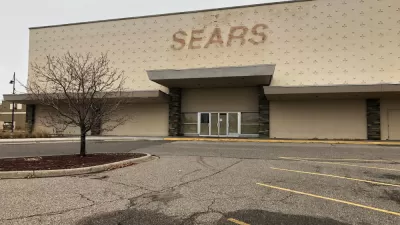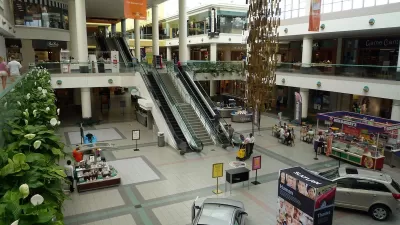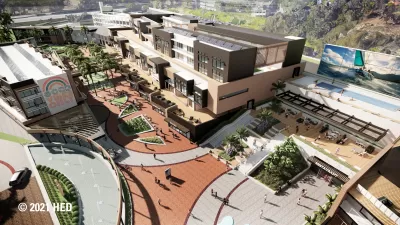Dead malls across the Bay Area are being transformed into R&D centers, housing, and transportation hubs.

With more and more American malls closing, their potential for redevelopment is growing. In the San Francisco Bay Area, a 400,000-square-foot project will reimagine the former Bayfair Center mall into a research and development center for tech companies.
As Chase Hunter explains in an article on SiliconValley.com, “The mall’s interior officially closed in early 2023, but the loss of Macy’s in April 2024 – a store that had been a tenant since the mall opened in 1957 – marked a turning point as developers focused on creating a new iteration of the property.” The property provides convenient access to existing infrastructure including the power and air conditioning necessary for R&D centers.
The trend is catching on in other parts of Silicon Valley. “In the South Bay, the city of Cupertino agreed in July with the owners of the Vallco Mall property to permit the construction of 2,700 housing units, with about a third set aside for affordable housing. And Prologis, a San Francisco-based real estate company that owns Hilltop Mall in Richmond, hopes to create a data center, a transportation hub and hundreds of housing units in collaboration with the city’s specific plan to redevelop the 145-acre area around the mall.”
Cities are taking notice, in some cases adjusting their zoning codes to make it easier for developers to adaptively reuse malls and encourage transit-oriented, mixed-use development. Meanwhile, the Bay Area Rapid Transit (BART) agency moved up the timeline for a station near Bayfair, “citing the Bay Fair station’s high rankings in development streamlining, market readiness for offices and development capacity.”
FULL STORY: What will happen to the Bay Area’s millions of square feet of closed mall space?

Maui's Vacation Rental Debate Turns Ugly
Verbal attacks, misinformation campaigns and fistfights plague a high-stakes debate to convert thousands of vacation rentals into long-term housing.

Planetizen Federal Action Tracker
A weekly monitor of how Trump’s orders and actions are impacting planners and planning in America.

In Urban Planning, AI Prompting Could be the New Design Thinking
Creativity has long been key to great urban design. What if we see AI as our new creative partner?

King County Supportive Housing Program Offers Hope for Unhoused Residents
The county is taking a ‘Housing First’ approach that prioritizes getting people into housing, then offering wraparound supportive services.

Researchers Use AI to Get Clearer Picture of US Housing
Analysts are using artificial intelligence to supercharge their research by allowing them to comb through data faster. Though these AI tools can be error prone, they save time and housing researchers are optimistic about the future.

Making Shared Micromobility More Inclusive
Cities and shared mobility system operators can do more to include people with disabilities in planning and operations, per a new report.
Urban Design for Planners 1: Software Tools
This six-course series explores essential urban design concepts using open source software and equips planners with the tools they need to participate fully in the urban design process.
Planning for Universal Design
Learn the tools for implementing Universal Design in planning regulations.
planning NEXT
Appalachian Highlands Housing Partners
Mpact (founded as Rail~Volution)
City of Camden Redevelopment Agency
City of Astoria
City of Portland
City of Laramie





























